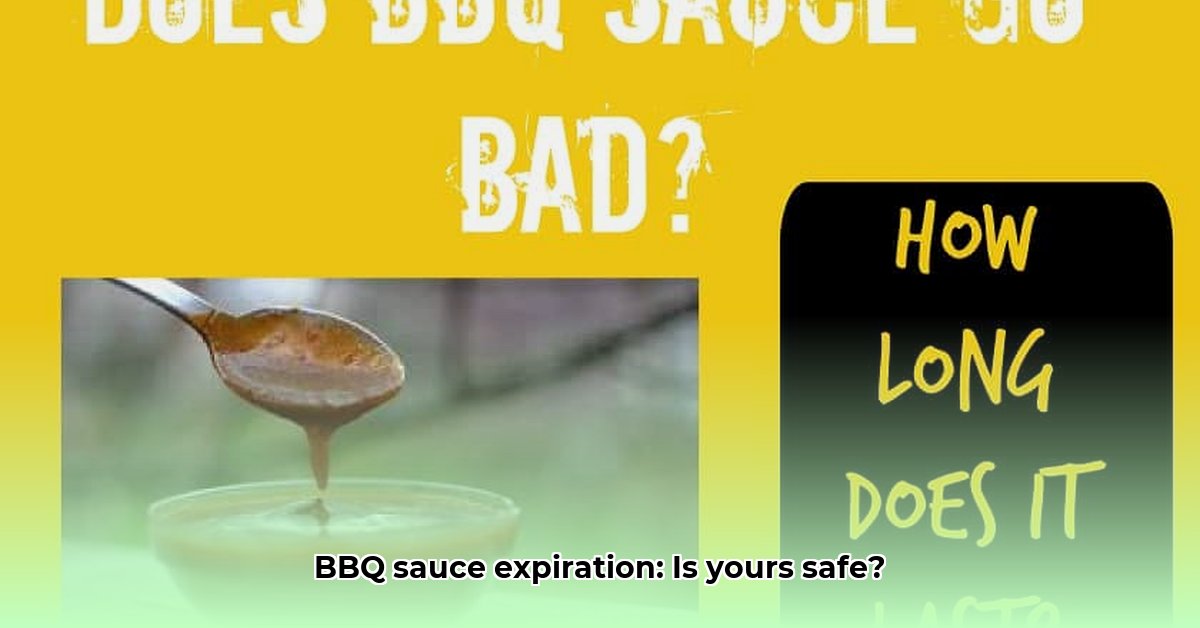Ever find a forgotten bottle of BBQ sauce in your fridge and wonder if it’s still safe to use? You’re not alone! This guide provides essential information on BBQ sauce shelf life, proper storage techniques, and how to recognize spoilage. We’ll break down the science of spoilage in an easy-to-understand way, empowering you to keep your BBQ sauce delicious and safe.
Does BBQ Sauce Go Bad?
BBQ sauce, that flavorful condiment that elevates any dish, does indeed go bad over time. The key factors influencing its lifespan are whether it’s opened, its ingredients, and how it’s stored. Let’s delve deeper into this.
Understanding BBQ Sauce’s Life Span
Think of BBQ sauce like a prized ingredient – it requires the right conditions to remain at its best. The lifespan of BBQ sauce hinges on whether it’s opened, its ingredients, and storage methods. An unopened bottle stored in a cool, dark, and dry place (like a pantry) can typically last for over a year. The “best by” date indicates peak flavor and texture, not a strict expiration date. While usable after this date, its taste might diminish.
Once opened, the countdown begins.
The Opened Bottle: How Long Will it Last?
Refrigeration becomes essential after opening. Refrigerating BBQ sauce serves as a protective measure, significantly extending its quality. Opened BBQ sauce usually maintains peak quality for about three to four months in the refrigerator. This doesn’t mean it’s unsafe afterward, but the taste may change and the texture could become less appealing – perhaps thinner, more sour, or separated. After four months, exercise caution and rely on your senses. When in doubt, discard it.
The Tell-Tale Signs: When to Say Goodbye
Your senses are vital in determining if your BBQ sauce is past its prime. Discard it if you observe any of these warning signs:
- Funky Smell: A sour, vinegary, or “off” odor signals spoilage. Trust your sense of smell; if it smells bad, it’s best to avoid it.
- Moldy Menace: The presence of mold renders the entire batch unsafe due to potentially harmful bacteria. Even a small amount of mold necessitates immediate disposal.
- Texture Transformation: A noticeably different consistency – much thinner, strangely thicker, or separated – suggests spoilage.
- Color Shift: While ingredients like chili peppers cause some darkening in certain sauces, extreme color changes accompanied by other spoilage indicators are cause for concern.
Extending Your Sauce’s Stay: Storage Smarts
To keep your BBQ sauce delicious longer, follow these tips:
- Refrigerate ASAP: Immediately refrigerate the bottle after opening in a cool, dark location.
- Smaller is Better: Transfer leftover sauce to smaller airtight containers to minimize air exposure, a major factor in spoilage. Mason jars are ideal for this purpose.
- Freeze for the Long Haul: For extended storage, freeze the sauce in ice cube trays for smaller portions or freezer bags for larger amounts. This extends the shelf life beyond four months, allowing for convenient use without thawing the entire batch.
Unopened BBQ Sauce: A Longer-Term Investment
Unopened bottles generally have a longer shelf life when stored in a cool, dark, and dry place. The “best by” date represents the manufacturer’s estimate for optimal flavor and texture. While it might still be safe to use after that date, taste satisfaction isn’t guaranteed.
The “Best By” Date vs. Actual Spoilage: A Clarification
The “best by” date is not a safety deadline but indicates when the manufacturer expects peak flavor. The sauce may still be usable after that date if it looks, smells, and feels normal, but caution is advised. When in doubt, discard it.
Frequently Asked Questions (FAQ)
Q: Does the vinegar in BBQ sauce affect how long it lasts?
A: Vinegar, a natural preservative, may extend the shelf life of sauces with higher vinegar content.
Q: Can I save leftover BBQ sauce from a restaurant?
A: It’s generally best to avoid this due to potentially less rigorous food safety standards in restaurant kitchens, increasing the risk of bacterial growth.
Q: How can you definitively tell if my BBQ sauce is unsafe?
A: When in doubt, discard it. Look for mold, off-odors, changes in texture or color—or any combination thereof. Food poisoning is far more trouble than it’s worth.
Following these guidelines ensures confident enjoyment of your BBQ sauce, knowing when it’s at its best and when to discard it. Remember, when in doubt, throw it out!
How to tell if homemade BBQ sauce has gone bad
Key Takeaways:
- Homemade BBQ sauce spoils faster than commercially produced varieties due to the absence of preservatives.
- Refrigeration is crucial for extending the shelf life of both homemade and opened store-bought BBQ sauce.
- Several visual and olfactory clues signal spoilage, including mold growth, off-odors, and changes in texture and color.
- Understanding these indicators helps ensure food safety and prevents wastage.
- Freezing can extend the shelf life of BBQ sauce, though it might alter the texture slightly.
Understanding BBQ Sauce Spoilage
Unlike store-bought BBQ sauce, homemade varieties lack preservatives, which significantly reduces their shelf life. This makes them more prone to spoilage, meaning you have to be extra careful. But how do you tell when it’s time to say goodbye to your homemade sauce?
Spotting the Signs: How to tell if homemade BBQ sauce has gone bad
Your senses are the best defense against spoiled food. Trust them!
- Mold: The most obvious sign; any visible mold requires immediate disposal.
- Off-Odors: A sour, rancid, or otherwise unpleasant smell indicates spoilage, even if the sauce looks fine.
- Texture Changes: Noticeably thicker, thinner, or separated sauce indicates deterioration. A slimy texture is also a clear sign of spoilage.
- Color Alteration: Significant color changes, such as unusual darkening or discoloration, can denote spoilage.
- Taste Test (with caution!): If unsure, taste a tiny amount. If it tastes “off,” discard it. Taste buds are sensitive to spoilage.
Extending the Life of Your BBQ Sauce
Proper storage is essential to maximizing the shelf life of your homemade BBQ sauce:
- Refrigerate Immediately: Refrigerate your BBQ sauce promptly after opening to slow down spoilage microorganisms.
- Airtight Containers: Store your sauce in airtight containers to prevent air exposure, which accelerates spoilage.
- Freezing for Long-Term Storage: Freezing significantly extends shelf life. Use freezer-safe containers and label them with the date.
- Thawing Properly: Thaw BBQ sauce slowly in the refrigerator to prevent bacterial growth. Avoid thawing at room temperature.
Commercial vs. Homemade: A Key Difference
Commercially produced BBQ sauces often contain preservatives, substantially extending their shelf life. Even these sauces should be refrigerated after opening to maintain quality and safety. Always check the “best by” date, but sensory checks are crucial.
Refrigerating BBQ Sauce for Extended Shelf Life in Hot Climates
Key Takeaways:
- The shelf life of BBQ sauce depends heavily on whether it’s homemade or commercially produced, and whether it’s been opened.
- Opened BBQ sauce, homemade or store-bought, needs refrigeration.
- Refrigerating BBQ Sauce for Extended Shelf Life in Hot Climates is paramount. Higher temperatures accelerate spoilage.
- Unopened commercial BBQ sauces generally last longer, but refrigeration still improves quality and extends its lifespan.
- Always inspect your BBQ sauce before using it. Look for mold, unusual colors, or off-putting smells.
Understanding BBQ Sauce Spoilage
Why does BBQ sauce spoil? Bacteria thrive in warm, moist environments, making BBQ sauce an ideal breeding ground. Sugar, acids, and other ingredients influence bacterial multiplication rates. Commercial sauces often contain preservatives to slow this process, but it doesn’t stop it entirely. Homemade sauces, lacking preservatives, spoil much faster. Heat accelerates bacterial growth, making refrigeration even more crucial in hot climates.
How to Store BBQ Sauce Properly
Proper storage is key:
- Unopened Commercial BBQ Sauce: Refrigeration maintains better quality and extends life, even though manufacturers often claim a long shelf life at room temperature.
- Opened Commercial BBQ Sauce: Refrigerate immediately to prevent bacterial growth and maintain freshness.
- Homemade BBQ Sauce: Refrigerate immediately after making it due to its decreased lifespan.
How Long Does BBQ Sauce Last?
Here’s a general guideline, but always use your senses:
| Sauce Type | Unopened Shelf Life (approx.) | Refrigerated Shelf Life (approx.) |
|---|---|---|
| Commercial BBQ Sauce | Up to 12 months (room temp), longer refrigerated | 6-12 months |
| Homemade BBQ Sauce | N/A (refrigerate immediately) | 1-3 weeks (depending on ingredients) |
Recognizing Spoilage Signs
Don’t rely solely on dates; inspect your BBQ sauce:
- Mold: Discard immediately if present.
- **Dis
- Stainless Steel Food Storage for Healthier, Eco-Friendly Meal Prep - February 27, 2026
- Stainless Food Containers Offer Durable Storage for Everyday Meals - February 26, 2026
- Stainless Steel Containers Offer Superior Food Preservation and Durability - February 25, 2026










